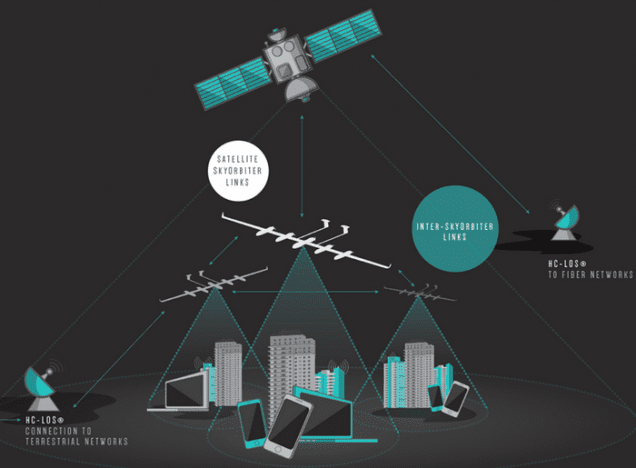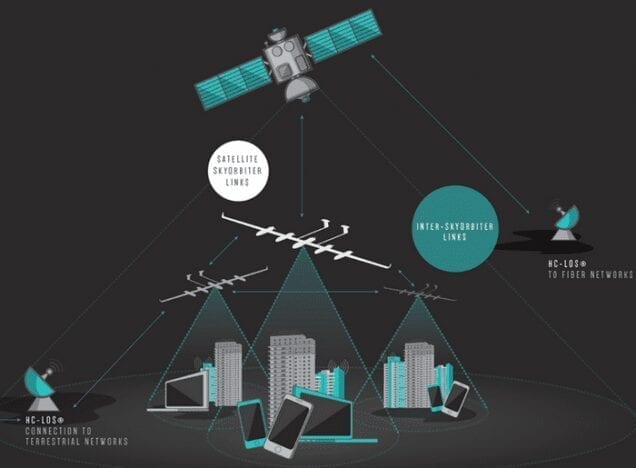
Communication has always played an integral role in history: 600 years ago our ancestors kickstarted globalization by way of sea and recent innovators built networking platforms to influence entire social movements
The internet has developed as the critical tool for communication and allowed the world to connect in remarkable ways. However, there are still people and countries that live without access to it. Today, a team at Portuguese company Quarkson is a modern-day Marco Polo of sorts: engineers working to make the internet available to every person on earth, an access declared by the United Nations as a human right.
The Portuguese company takes communication from the sea to the sky as they develop and build a constellation of SkyOrbiters, long-endurance unmanned satellites designed to offer Internet to the most remote corners of the world. The fleet of SkyOrbiters will orbit the Earth in various low and high altitudes in the atmosphere rather than space. Six models are to be powered by fossil fuel while the remaining three models will harvest power through a solar array on their wings, allowing the cutting-edge technology to fly around the world for weeks, months, or years without the need to stop or refuel.
State-of-the-art structural design components allow the SkyOrbiters to deliver a range of access to telecommunications and broadcasting services across low-density and high-density platforms. The SkyOrbiters are used in conjunction with systems being developed, including the revolutionary Skylink, a wireless communication service delivered from various SkyOrbiter platforms. Including internet, Skylink is expected to fulfill a myriad of other services such as public protection, disaster relief and environmental monitoring. The benefits of such vastly influential technology includes large-area broadcasting, development of world applications and greater military communication. According to Quarkson, the aerial vehicles can be built at a low-cost and with rapid deployment in comparison to traditional satellites.
The Latest on: SkyOrbiter
[google_news title=”” keyword=”SkyOrbiter” num_posts=”10″ blurb_length=”0″ show_thumb=”left”]
via Google News
The Latest on: SkyOrbiter
- Watch Sky Sports F1on May 9, 2024 at 4:59 pm
In a year that saw Max Verstappen claim a third world championship, look back on the story of 2023 with the some of the best Sky F1 features.
- Julen Lopetegui is already drawing up lists of potential buys for West Ham this summer - Paper Talkon May 9, 2024 at 4:59 pm
Manchester United are preparing an opening offer for highly-rated Benfica midfielder Joao Neves, according to reports. Sir Jim Ratcliffe is reportedly set to entrust three directors to make a ...
- Space Explorationon May 9, 2024 at 4:59 pm
On May 10, 1967, a NASA research aircraft known as the wingless M2-F2 lifting body crashed on Rogers Dry Lakebed at the Dryden Flight Research Center in California. Sierra Space's first Dream ...
- What is Sky Broadband Ultrafast? We reveal everything you need to know about the premium internet packageon May 9, 2024 at 1:00 am
Sky launched its Broadband Ultrafast package at the end of 2020, promising download speeds of up to 12 times faster than the company’s standard broadband offering. Below, we’ll run through ...
- ESA Solar Orbiter captures breathtaking up-close video of the Sunon May 5, 2024 at 5:00 pm
If you buy through a BGR link, we may earn an affiliate commission, helping support our expert product labs. Last year, the European Space Agency’s Solar Orbiter drew closer to the Sun than it ...
- Why the moon's south pole is the chequered flag of space race 2.0on May 3, 2024 at 8:36 am
The chequered flag of Space Race 2 An abundant source of ice in the deeply shadowed south pole craters would help sustain a human base on the moon, providing hydration, oxygen and the ingredients ...
- Chinese mission blasts off to far side of moon: What you need to know about NASA and China's space raceon May 2, 2024 at 11:17 pm
China's Chang'e-6 robotic spacecraft blasts off, hoping to become the first mission to collect rock and soil samples from the far side of the moon. Since the first Chang'e mission in 2007, named ...
- Best Sky TV and broadband deals for May 2024on May 1, 2024 at 8:53 am
It’s fair to say that when it comes to the best broadband and TV packages, Sky is arguably the leading provider, especially here in the UK. Sky stands out for its wide choice of options on ...
- Night sky, May 2024: What you can see tonight [maps]on May 1, 2024 at 6:30 am
Find out what's up in your night sky during May 2024 and how to see it in this Space.com stargazing guide. Looking for a telescope for the next night sky event? We recommend the Celestron Astro Fi ...
- Best Sky TV deals and packages for May 2024on May 1, 2024 at 3:47 am
Welcome to T3's best Sky TV deals for 2024 guide. This is the place where our dedicated deal-hunting team display today's very best offers on Sky TV packages – and prices start from as low as ...
via Bing News










